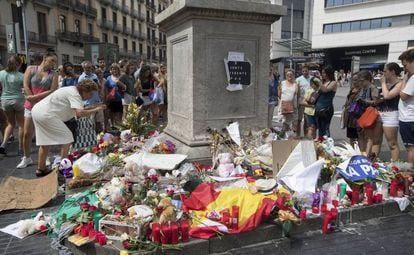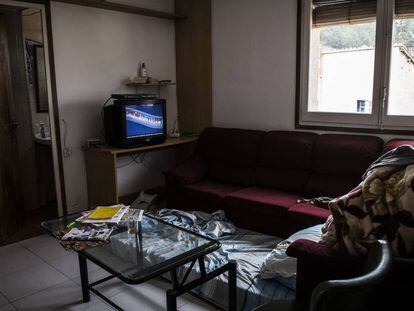Catalan regional government admits it received warning of possible attack
Officials say US intelligence information ahead of Barcelona killings was not regarded as credible


Authorities in Catalonia admitted on Thursday that the northeast region’s police force, the Mossos d’Esquadra, was warned about a possible terrorist attack on the La Rambla boulevard this summer.
On August 17, a van was driven at high speed down Barcelona’s central La Rambla boulevard, killing 14 people.
The Catalan authorities say they received multiple warnings in the first half of 2017 of possible attacks in Barcelona
Speaking at a press conference on Thursday, the head of the Mossos d’Esquadra, Josep Lluís Trapero, and Catalonia’s chief of interior affairs, Joaquim Forn, said that the warning did not come from the CIA or any counter-insurgency agency in the United States, but refused to reveal the sources. “The warning was not very credible,” said Forn, adding that it was passed on to state authorities, which “didn’t see it as credible.”
Spanish counter-terrorism sources had previously confirmed that US intelligence warned Spain that the so-called Islamic State (ISIS) was planning “terrorist attacks against busy tourist spots in Barcelona, specifically La Rambla,” according to the text, which has been published by El Periódico de Cataluña and seen by El PAÍS.
On May 25, the warning was passed on to the Mossos d’Esquadra, the regional police force in Catalonia and the body tasked with counter-terrorism in the northeastern region, according to the same sources. The Catalan government has denied receiving any warning.
The warning said: “Uncorroborated information of unknown veracity from end of May 2017 indicated that the Islamic State of Iraq and ash Sham (ISIS) were planning to carry out non-specified terrorist attacks during the summer against busy tourist spots in Barcelona, Spain, specifically, La Rambla street.”
The warning mentioned “uncorroborated information of unknown veracity”
Spanish counter-terrorism sources say the document was sent by US intelligence to Spain’s National Intelligence Center, the National Police, the Civil Guard and the Intelligence Center Against Terrorism and Organized Crime (CITCO) on May 25. As soon as the warning was received from US intelligence, it was passed on by the National Police to Manel Castellví, the head of Information at the Mossos, according to the sources cited.
The warning did not provide telephone numbers, names or any other lead that might have been followed up to prevent the attack on August 17. The US agency that made the warning points out that the information “is only for intelligence use” and can only be used for certain purposes.
“This information is provided for intelligence purposes as part of an effort to develop potential investigative leads. It cannot be used in any way that would expose or compromise the sources or methods of intelligence. It cannot be used in relation to judicial proceedings externally or nationally, or for other legal, judicial or administrative ends,” reads the document.
Forn said that the regional police in Catalonia had been receiving warnings about possible attacks in the months prior to the events of August 17 “in different points of Catalonia, among them “places of worship, infrastructure, concerts, sporting events, and places where large numbers of people congregate, such as La Rambla and the Sagrada Familia.”
Trapero said that the warning about an attack on La Rambla was “received and evaluated,” and was discussed with “state officials”
Enric Millo, the central government’s delegate in Catalonia, said the information “existed and was shared, as always, with the security forces.” Millo did not specify what level of credibility was given to the warning.
Ada Colau, the mayor of Barcelona, said that City Hall “never had any knowledge” of a warning about a possible terrorist attack. Speaking to radio station Cadena Ser, she said that if she wasn’t informed, it was because the regional government “gave no credibility to the threat.”
English version by Nick Lyne.












































